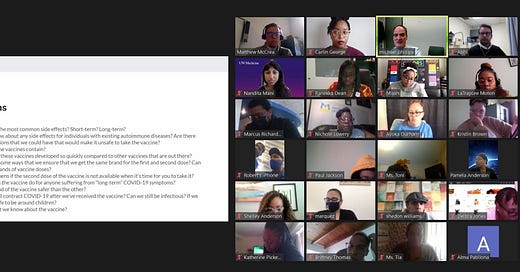SARS-CoV2 vaccines: dispatch from a town hall
Infectious Disease experts answer questions from charter school teachers
Two weeks ago, an old college friend, now the Executive Director of the Meridien Public Charter School network in Washington, D.C., reached out to me with a request. His teachers would all be offered vaccinations soon, and many of them were skeptical. He asked if I knew any experts who would be willing to spend an hour talking to and answering questions from his teachers.
It was my privilege and pleasure to put him in touch with Dr Michael Phillips and Dr Nandita Mani who graciously agreed to be panelists for a virtual town hall. The discussion and Q&A in that town was one of the most impactful medical events I’ve been part of. Nearly 100 teachers, most of them people of color, came prepared with timely and important questions. And the panelists answers were more thorough, and more importantly, relatable.
Because I feel many of us have the same concerns as those teachers, I’m sharing some of the highlights from the town hall here. All answers reflect a combination of Dr Phillip’s and Dr Mani’s replies to the teachers’ questions, along with some supporting material.
Is this new mRNA vaccine technology safe?
It’s important to understand that while mRNA vaccines haven’t been produced and deployed at this scale before, they’re actually not that new. They were first developed in the early 1990s and have been studied and produced for a number of different viruses, and even cancers. In the context of SARS-CoV2, they’re considered safe and very effective.
Is one brand better or safer than another?
No, at least not in any meaningful way. The two vaccines (Pfizer/BioNtech and Moderna) approved under emergency use authorization in the U.S, show similar efficacy and safety profiles. That is to say, they both work very well (~95% efficacy) and have very similar side effect profiles, with the vast majority of side effects either being site specific reactions (i.e. a sore arm or shoulder after the shot) or some mild fevers and muscle aches that respond well to good old-fashioned Tylenol (more details here in my older post). Those eligible and willing to be vaccinated should take the first available dose, regardless of brand.
If I’m pregnant, should I take the vaccine?
In general, yes, vaccination of pregnant people is encouraged. This recommendation comes from an understanding that SARS-CoV2 infection during pregnancy leads to an increased risk of having severe COVID-19 disease (i.e. more likely to be hospitalized, and more likely to be intubated), and an increased risk of pre-term delivery. The main reason no one is making a stronger recommendation for or against vaccinating during pregnancy is because pregnant people were NOT included in the Moderna and Pfizer clinical trials (more details in my older post)
However, context matters.
Let’s consider two different pregnancies. In one, the pregnant woman is isolating indoors with sparse contact with known individuals up until the point of delivery. In the other, the woman is a healthcare worker clocking in well into her first trimester. The answers here aren’t clear and obvious, especially given the fact that we don’t know anything about the dynamics of passing maternal antibodies to the newborn.
Oh, and regarding mRNA vaccine technology and pregnancy - in the 20+ years it’s been studied, there is no evidence that the mRNA platform adversely impact pregnancies and newborn health.
As people of color, what can you say to us to alleviate our concerns and mistrust of a government-led vaccination program?
For those who might not have inherited or experienced a sense of mistrust of science and medicine, this is a question we are privileged enough not to face. For many people-of-color, this is reality. I don’t know how our panelists felt when they heard this question, but Dr Phillips and Dr Mani took it in stride. To quote Dr Phillips’ opening line, “I don’t know that there is anything I can do or say to alleviate your concern or gain your trust right now. I think all I can do is to acknowledge that your community has been wronged in the past. I can only ask you for your trust [as we move forward with these vaccinations]”. It was an incredibly humble and powerful response. Several members of the Zoom audience could be seen nodding along - and absolutely no one was looking down at their phone or away from the screen during this exchange.
Hot Take
When I step back / zoom out on the pandemic and think about how much progress the medical and public health communities have made since we identified the virus, I am absolutely amazed and awed by it all. But discovering the virus and designing an effective vaccine are only half of the battle. Vaccination isn’t one size fits all. Above all else, vaccinating a society means addressing people. It means educating them, and gaining their trust. Dr. Phillips’ response to that question was a reminder that despite the awesome technologies we have to develop and produce a vaccine at the speed and scale that we have, the real challenge is a human one. I hope there are more Michael Phillips and Nandita Manis out there talking to teachers, service employees, and other groups.



